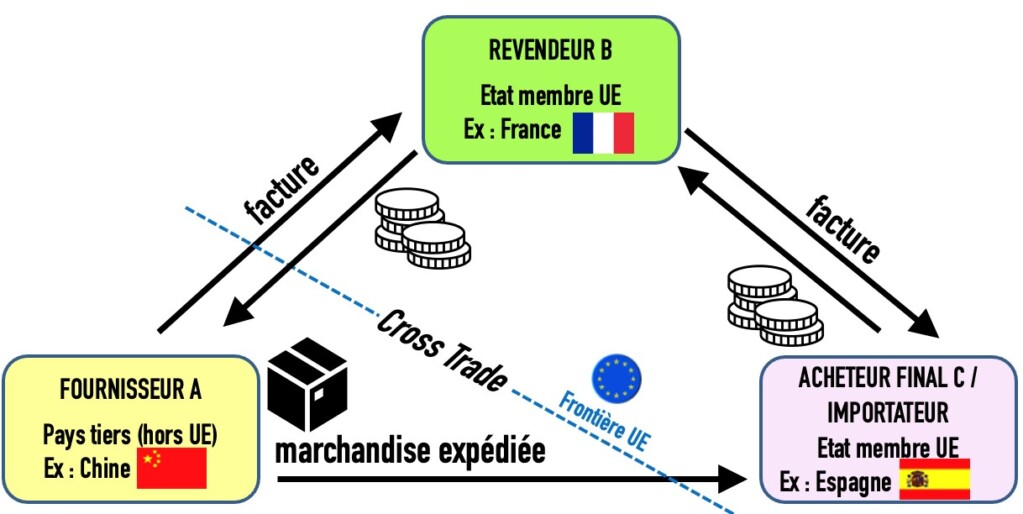Do you practice cross-trading? ? When it comes to international trade, cross-trade operations offer considerable logistical advantages, from cost reduction to speed of delivery. The goods you sell do not pass through your warehouses. However, the practice of cross trade raises questions of transparency, taxation and risk management. So, between opportunities and risks, what are the strategies for making a success of your cross-trade operations and optimising your supply chain? ? Alain Wolgensinger, international trade specialist, takes a closer look.

Cross trade: what is it?
Also known as the "triangular operation", the cross trade refers to a transaction in which your company sells goods and has them shipped directly from the supplier to the customer. In other words, the goods no longer pass through your warehouse. Your company simply manage a financial flow Cross-trade: receiving (and paying) the supplier's invoice, issuing (and being paid) the customer's invoice. Example of a cross-trade transaction:

This practice is common in e-commerce, where we talk about drop shipping (direct delivery).
Key figures for drop shipping :
According to a recent report from Grand View Researcha US consultancy firm, the global drop shipping market accounted for nearly 226 Md$ in 2022. This market is also expected to experience "significant growth". between 2023 and 2030of the order of + 23.4 % per year. This growth can be explained by an increased preference for online shopping, coupled with the growing trend towards cross-border e-commerce.
This trend is confirmed by the latest report from Fevad (the French e-commerce and distance-selling federation). In the United States, e-commerce sales will exceed 1,000 bn$ in 2022 (+8.5 % compared with 2021), representing a stable share of retail trade compared with 2021 (14.7 %). In France, sales in the e-commerce sector reached almost 147 billion euros in 2022, up 13.8 % over one year. In the United States, 23 % of online sales are said to be made via drop shipping (according to a report by Forrester Researchanother US consultancy, in 2017). Applied to France, this would represent some €33 billion in sales.
Cross-trade opportunities
The practice of cross-trading has become commonplace in the current global context. It offers undeniable advantages to companies.
Reduced logistics costs
By eliminating physical warehousing, companies save on storage and handling costs. And this is essential for profitability.
Tim Cook, Apple's CEO, denounces stock as an evil because, according to him, it costs 1 to 2 % of the product's value... per week!
International expansion made easy
The cross-trade approach also enables companies to explore new international markets without the logistical constraints. An SME can serve several countries from a single supplier on the same continent.
Optimised delivery times
By shipping directly from the supplier to the customer, companies can speed up delivery times. This avoids having to receive and then reship the product.
Reduced manufacturing costs
A shaping operation abroad reduces import duties and taxes. For example: assembly of car parts or sub-assemblies in India.
The challenges of cross trade
To successfully implement cross-trade operations, it is first necessary to identify the potential pitfalls.
Asking the right questions (non-exhaustive list)
Transparency and confidentiality ?
Could the supplier be tempted to contact your customer directly in the future?
What level of expertise ?
Does your supplier have all the skills required (customs, administrative, human) for delegated logistics?
Points to watch :
Due to lack of practice or time pressure, the supplier may forget to have a document signed by customs in his country (for example: EUR1). This would result in a blockage in the country of arrival.
What control options ?
Traceability: how can you carry out quality control - one-off and/or long-term - on a product shipped far from you?
Responsibility: how to make your cross trade compatible with your CSR policy ?
What tax treatment to apply ?
Can you invoice exclusive of VAT? In other words, do you have the necessary proof authorising you to do so (customs declaration, transport document, etc.)?
Which origin to display ?
It can be a thorny issue.
Example:
Does your customer think they are buying a product made in France (and therefore substantially processed in France)? Does the origin change if the product is first processed abroad?
Currency risk management ?
This question arises if your supplier invoices you in a currency other than the one in which you invoice your customer.
What's the best strategy for successful cross-trade transactions?
Successful cross-trading requires a methodical approach. The strategy is based on 7 essential pillars.
1/ Internal involvement
La decision top-down of the company's management is recommended to ensure that everyone takes ownership of this sometimes complex issue. And as a reminder of the CSR challenge! Cross-trade can involve different departments within the company. Sometimes, participation will be ad hoc... but always active.
This internal engagement strategy may take the form of exchanges of information or free discussion (such as the following). brainstorming), followed by implementation workshops on the subjects identified.
For example:
- accounting, for the issue of invoicing before tax and the retention of documents
- the sales department and the sales administration department to monitor delivery
- the legal department to ensure that the company has a charter of good conduct for suppliers to sign and up-to-date general purchasing conditions
2/ Optimising international logistics
It is crucial to establish partnerships with the main suppliers concerned and/or service providers who are experts in international logistics (3PLs or even 4PLs capable of designing global solutions).
3/ Local and global digital management
Local, because the company's information department must ensure that the system used is appropriate and, if necessary, invest in expert information systems: WMS (for warehouses), TMS (for transport), ERP integration if the stakes justify it.
Overall, because Extranet-type interconnections with key suppliers can be very useful. Especially if it facilitates access to the documentary evidence that needs to be carefully preserved.
4/ Financial management
Use financial instruments such as forward contracts or tools offered by specialist organisations can help you protect yourself against exchange rate fluctuations.
5/ Legal management
Regulatory compliance: working with international trade experts ensures compliance with international laws and regulations.
Questions about customs regulation (origin) require special attention.
6/ Corporate social responsibility (CSR)
Maintaining good CSR practices throughout the supply chain (upstream and downstream) is essential.
7/ Staff training
Last but not least, train your teams in international logistics and the customs regulations to minimise errors!
Case study :
LogiMultiTech* is a company specialising in the sale of consumer technology products. It faces high logistics costs and long delivery times. This is the result of transporting goods from its international suppliers to its warehouse and then on to its customers.
His solution?
Implementing a cross-trade strategy, with 4 main focuses.
- Optimising international partnerships: LogiOptiTech first selects reliable suppliers in Asia. In other words, suppliers who can guarantee product quality and deliver direct to end customers in Europe.
- Simplifying financial transactions: it is setting up fluid financial protocols with its Asian suppliers and European customers. The aim? To ensure rapid, secure payments with no significant impact on cash flow.
- Acquiring the technologies needed for an agile supply chain : The company is also integrating an innovative logistics platform, improving product traceability from Asia to Europe. This reduces errors, improves real-time visibility and strengthens communication between the players in the chain.
- Switch to direct delivery: it eliminates intermediate storage in Europe.
Overcoming difficulties
LogiOptiTech had to adapt its existing IT systems to the new strategy, conduct complex negotiations with suppliers, adapt to cultural differences and customs requirements, and train its staff in the new procedures.
Tangible gains
Thanks to the implementation of cross trade, LogiOptiTech has reduced its logistics costs by 20 %. It has considerably shortened its delivery times, from 15 days to just 5. The company has also recorded a 15 % increase in customer satisfaction, strengthening its competitive position in the market.
*A fictitious example designed to provide a concrete illustration of the concepts discussed in this article. Nevertheless, this case study is intended to be representative of cross-trade strategies and their potential benefits for logistics optimisation.
In conclusion, some aspects may require more thought than others. However, this careful - but accessible - management will enable your company to take full advantage of the benefits and opportunities of cross trade, while minimising the risk of (un)pleasant surprises.





